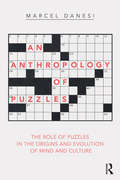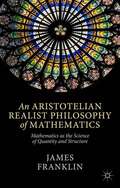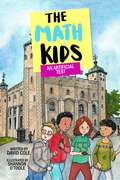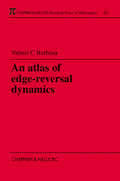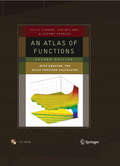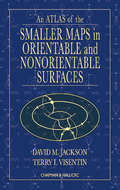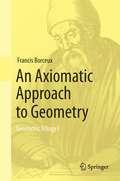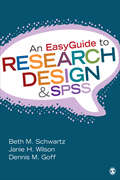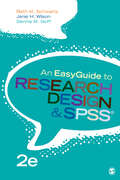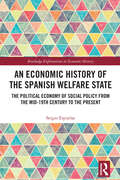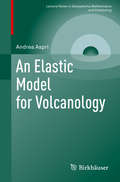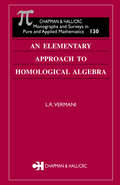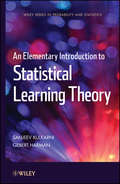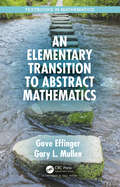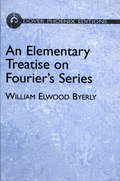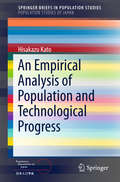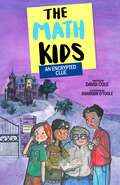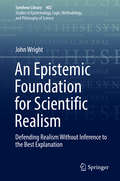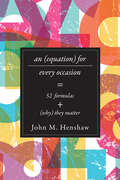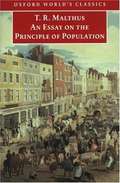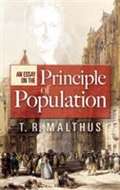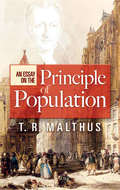- Table View
- List View
An Anthropology of Puzzles: The Role of Puzzles in the Origins and Evolution of Mind and Culture
by Marcel DanesiAn Anthropology of Puzzles argues that the human brain is a "puzzling organ" which allows humans to literally solve their own problems of existence through puzzle format. Noting the presence of puzzles everywhere in everyday life, Marcel Danesi looks at puzzles in society since the dawn of history, showing how their presence has guided large sections of human history, from discoveries in mathematics to disquisitions in philosophy. Danesi examines the cognitive processes that are involved in puzzle making and solving, and connects them to the actual physical manifestations of classic puzzles. Building on a concept of puzzles as based on Jungian archetypes, such as the river crossing image, the path metaphor, and the journey, Danesi suggests this could be one way to understand the public fascination with puzzles. As well as drawing on underlying mental archetypes, the act of solving puzzles also provides an outlet to move beyond biological evolution, and Danesi shows that puzzles could be the product of the same basic neural mechanism that produces language and culture. Finally, Danesi explores how understanding puzzles can be a new way of understanding our human culture.
An Aristotelian Realist Philosophy of Mathematics
by James FranklinMathematics is as much a science of the real world as biology is. It is the science of the world's quantitative aspects (such as ratio) and structural or patterned aspects (such as symmetry). The book develops a complete philosophy of mathematics that contrasts with the usual Platonist and nominalist options.
An Artificial Test: The Math Kids (Book 8) (The Math Kids)
by David ColeAfter a tough end to the school year, the Math Kids—Jordan, Justin, Stephanie, and Catherine—take a jet to London for an exciting summer vacation. But between exploring the city and seeing the sights, they&’re quickly drawn into investigations of terrorist activity. Authorities are on high alert because of threats to landmarks across the city. But there&’s something odd about the messages. Working alongside Bobby, a police officer tasked with being their trip guide, the kids must uncover the true purpose of a mysterious online message board or risk being sent home early. With their vacation plans and the safety of London at risk, the Math Kids are in for their most complex case yet!Finalist for the Foreword INDIES Book of the Year AwardsAn abundantly diverting middle grade mystery seasoned with history and intrigue…A fast-moving plot, and the characters&’ fun banter will encourage even reluctant readers to test the waters. Full of mystery, puzzles, and intrigue, this solid, tightly plotted read is a winner for middle graders. Un-put-downable. - The Prairies Book Review
An Atlas of Edge-Reversal Dynamics (Chapman & Hall/CRC Research Notes in Mathematics Series)
by V.C. BarbosaThis important resource offers the first in-depth account of the graph dynamics system SER (Scheduling by Edge Reversal),. In Part 1: Edge-Reversal Dynamics, the author discusses the main applications and properties of SER, provides data from statistics and correlations computed over several graph classes, and gives an overview of the algorithmic aspects of the construction of the catalogue. Part 2: The Atlas comprises the atlas proper-a catalogue of graphical representations of all basins of attraction generated by the SER mechanism for all graphs in selected classes.
An Atlas of Functions: with Equator, the Atlas Function Calculator
by Keith B. Oldham Jerome Spanier Jan MylandThis second edition of An Atlas of Functions, with Equator, the Atlas Function Calculator, provides comprehensive information on several hundred functions or function families, of interest to all those scientists, engineers and mathematicians who are concerned with the quantitative aspects of their field. Beginning with simple integer-valued functions, the book progresses to polynomials, exponential, trigonometric, Bessel, and hypergeometric functions, as well as many more. The 65 chapters are arranged roughly in order of increasing complexity, mathematical sophistication being kept to a minimum while utility is stressed throughout. In addition to providing definitions and simple properties for every function, each chapter catalogs more complex interrelationships as well as the derivatives, integrals, Laplace transforms and other characteristics of the function. Numerous color figures in 2 or 3 dimensions depict their shape and qualitative features and flesh out the reader's familiarity with the functions. In many instances, the chapter concludes with a concise exposition on a topic in applied mathematics associated with the particular function or function family. Features that make the Atlas an invaluable reference tool, yet simple to use, include: full coverage of those functions--elementary and "special"--that meet everyday needsa standardized chapter format, making it easy to locate needed information on such aspects as: nomenclature, general behavior, definitions, intrarelationships, expansions, approximations, limits, and response to operations of the calculusextensive cross-referencing and comprehensive indexing, with useful appendicesthe inclusion of innovative software--Equator, the Atlas Function Calculatorthe inclusion of new material dealing with interesting applications of many of the function families, building upon the favorable responses to similar material in the first edition.
An Atlas of the Smaller Maps in Orientable and Nonorientable Surfaces (Discrete Mathematics and Its Applications)
by David Jackson Terry I. VisentinMaps are beguilingly simple structures with deep and ubiquitous properties. They arise in an essential way in many areas of mathematics and mathematical physics, but require considerable time and computational effort to generate. Few collected drawings are available for reference, and little has been written, in book form, about their enumerative a
An Axiomatic Approach to Geometry: Geometric Trilogy I
by Francis BorceuxFocusing methodologically on those historical aspects that are relevant to supporting intuition in axiomatic approaches to geometry, the book develops systematic and modern approaches to the three core aspects of axiomatic geometry: Euclidean, non-Euclidean and projective. Historically, axiomatic geometry marks the origin of formalized mathematical activity. It is in this discipline that most historically famous problems can be found, the solutions of which have led to various presently very active domains of research, especially in algebra. The recognition of the coherence of two-by-two contradictory axiomatic systems for geometry (like one single parallel, no parallel at all, several parallels) has led to the emergence of mathematical theories based on an arbitrary system of axioms, an essential feature of contemporary mathematics. This is a fascinating book for all those who teach or study axiomatic geometry, and who are interested in the history of geometry or who want to see a complete proof of one of the famous problems encountered, but not solved, during their studies: circle squaring, duplication of the cube, trisection of the angle, construction of regular polygons, construction of models of non-Euclidean geometries, etc. It also provides hundreds of figures that support intuition. Through 35 centuries of the history of geometry, discover the birth and follow the evolution of those innovative ideas that allowed humankind to develop so many aspects of contemporary mathematics. Understand the various levels of rigor which successively established themselves through the centuries. Be amazed, as mathematicians of the 19th century were, when observing that both an axiom and its contradiction can be chosen as a valid basis for developing a mathematical theory. Pass through the door of this incredible world of axiomatic mathematical theories!
An EasyGuide to Research Design & SPSS
by Dr Janie H. Wilson Dr Beth M. Schwartz Dennis M. GoffAn EasyGuide to Research Design & SPSS provides clear and concise guidance for selecting the most appropriate design and statistical analysis to test a research hypothesis. By connecting experimental design with an appropriate statistical test for data analysis, the EasyGuide details the exact steps for inputting and analyzing data in SPSS, offers a “how-to” for interpreting the output from SPSS analyses, and provides guidance in formatting SPSS output into APA style.
An EasyGuide to Research Design & SPSS (EasyGuide Series)
by Janie H. Wilson Beth M. Schwartz Dennis M. GoffAn EasyGuide to Research Design and SPSS® is an essential resource for students to successfully navigate and complete research projects. Using a clear, concise, and conversational writing style, authors Beth M. Schwartz, Janie H. Wilson, and Dennis M. Goff cover all of the most basic and common designs and analyses that students need to know for appropriately testing a hypothesis. The handbook includes step-by-step instructions accompanied by ample screenshots for working with data in SPSS®, along with guidance on interpreting outputs and formatting results in APA style. The Second Edition features a streamlined organization, updated references, and new content on factorial designs, effect size, and G*Power.
An EasyGuide to Research Design & SPSS (EasyGuide Series)
by Janie H. Wilson Beth M. Schwartz Dennis M. GoffAn EasyGuide to Research Design and SPSS® is an essential resource for students to successfully navigate and complete research projects. Using a clear, concise, and conversational writing style, authors Beth M. Schwartz, Janie H. Wilson, and Dennis M. Goff cover all of the most basic and common designs and analyses that students need to know for appropriately testing a hypothesis. The handbook includes step-by-step instructions accompanied by ample screenshots for working with data in SPSS®, along with guidance on interpreting outputs and formatting results in APA style. The Second Edition features a streamlined organization, updated references, and new content on factorial designs, effect size, and G*Power.
An Economic History of British Steam Engines, 1774-1870: A Study on Technological Diffusion (Contributions to Economics)
by Haris KitsikopoulosThis book traces the diffusion trajectory of the second and third generation of British steam engines, the Watt and high-pressure models, covering the period 1774 to 1870. It begins by subjecting to econometric analysis the latest version of Dr. Kanefsky's database on 18th century steam engines coming up with an upward revision of the total amount of horsepower installed by 1800. Subsequent chapters delve into the determinants of the diffusion process through the third quarter of the 19th century relating to engines used both in mining and industry as well as transportation (railways, steam cars). The book's main contribution to the literature lies in drawing material from a very large volume of 18th- and 19th-century sources found in the Dibner Library of Rare Books, Smithsonian, and by utilizing a fair amount of technical literature pertaining to the economic factors driving the diffusion process. This great expansion of the empirical material has led to bringing multiple revisions to the work of other authors on the key aspects and determinants of the diffusion process. In conjunction with the publication by the author of an earlier monograph on the first generation of steam engines, the Newcomen model, the present study completes the task of offering the most comprehensive account of the preeminent and most strategic technology of the British Industrial Revolution. This book will appeal to students, scholars, and researchers of economic history and history of technology, interested in a better understanding of the industrial revolution in general and the role of British steam engines in particular.
An Economic History of the Spanish Welfare State: The Political Economy of Social Policy from the Mid-19th Century to the Present (Routledge Explorations in Economic History)
by Sergio EspuelasThis monograph analyses the evolution of the welfare state in Spain from qualitative and quantitative perspectives. It basically relies on estimates of public social spending from 1850 to the present and offers comparisons with the rest of Europe.As a whole, the volume sheds light on the historical, political, and economic conditions at play during the relatively late development of the Spanish welfare state. Three key driving factors are explored: the political regime, social inequality, and Spain’s exposure to international markets. While economic backwardness and demographic factors explain part of the story, Espuelas demonstrates that inequality explains much of the pre-1936 gap; the lack of democracy and the Franco dictatorship were crucial up to the 1970s, and globalization, rather than having a clear positive or negative effect, has mainly influenced the way social policy is financed.This volume will be of interest to advanced students and researchers of economic history, welfare states, European history, and social policy.
An Elastic Model for Volcanology (Lecture Notes in Geosystems Mathematics and Computing)
by Andrea AspriThis monograph presents a rigorous mathematical framework for a linear elastic model arising from volcanology that explains deformation effects generated by inflating or deflating magma chambers in the Earth’s interior. From a mathematical perspective, these modeling assumptions manifest as a boundary value problem that has long been known by researchers in volcanology, but has not, until now, been given a thorough mathematical treatment. This mathematical study gives an explicit formula for the solution of the boundary value problem which generalizes the few well-known, explicit solutions found in geophysics literature. Using two distinct analytical approaches—one involving weighted Sobolev spaces, and the other using single and double layer potentials—the well-posedness of the elastic model is proven. An Elastic Model for Volcanology will be of particular interest to mathematicians researching inverse problems, as well as geophysicists studying volcanology.
An Elementary Approach to Homological Algebra (Monographs and Surveys in Pure and Applied Mathematics)
by L.R. VermaniOften perceived as dry and abstract, homological algebra nonetheless has important applications in a number of important areas, including ring theory, group theory, representation theory, and algebraic topology and geometry. Although the area of study developed almost 50 years ago, a textbook at this level has never before been available. An Elementary Approach to Homological Algebra fills that void. Designed to meet the needs of beginning graduate students, the author presents the material in a clear, easy-to-understand manner with many examples and exercises. The book's level of detail, while not exhaustive, also makes it useful for self-study and as a reference for researchers.
An Elementary Introduction to Mathematical Finance
by Sheldon M. RossThis textbook on the basics of option pricing is accessible to readers with limited mathematical training. It is for both professional traders and undergraduates studying the basics of finance. Assuming no prior knowledge of probability, Sheldon M. Ross offers clear, simple explanations of arbitrage, the Black-Scholes option pricing formula, and other topics such as utility functions, optimal portfolio selections, and the capital assets pricing model. Among the many new features of this third edition are new chapters on Brownian motion and geometric Brownian motion, stochastic order relations, and stochastic dynamic programming, along with expanded sets of exercises and references for all the chapters.
An Elementary Introduction to Statistical Learning Theory
by Gilbert Harman Sanjeev KulkarniA thought-provoking look at statistical learning theory and its role in understanding human learning and inductive reasoningA joint endeavor from leading researchers in the fields of philosophy and electrical engineering, An Elementary Introduction to Statistical Learning Theory is a comprehensive and accessible primer on the rapidly evolving fields of statistical pattern recognition and statistical learning theory. Explaining these areas at a level and in a way that is not often found in other books on the topic, the authors present the basic theory behind contemporary machine learning and uniquely utilize its foundations as a framework for philosophical thinking about inductive inference.Promoting the fundamental goal of statistical learning, knowing what is achievable and what is not, this book demonstrates the value of a systematic methodology when used along with the needed techniques for evaluating the performance of a learning system. First, an introduction to machine learning is presented that includes brief discussions of applications such as image recognition, speech recognition, medical diagnostics, and statistical arbitrage. To enhance accessibility, two chapters on relevant aspects of probability theory are provided. Subsequent chapters feature coverage of topics such as the pattern recognition problem, optimal Bayes decision rule, the nearest neighbor rule, kernel rules, neural networks, support vector machines, and boosting.Appendices throughout the book explore the relationship between the discussed material and related topics from mathematics, philosophy, psychology, and statistics, drawing insightful connections between problems in these areas and statistical learning theory. All chapters conclude with a summary section, a set of practice questions, and a reference sections that supplies historical notes and additional resources for further study.An Elementary Introduction to Statistical Learning Theory is an excellent book for courses on statistical learning theory, pattern recognition, and machine learning at the upper-undergraduate and graduate levels. It also serves as an introductory reference for researchers and practitioners in the fields of engineering, computer science, philosophy, and cognitive science that would like to further their knowledge of the topic.
An Elementary Transition to Abstract Mathematics (Textbooks in Mathematics)
by Gary L. Mullen Gove EffingerAn Elementary Transition to Abstract Mathematics will help students move from introductory courses to those where rigor and proof play a much greater role. The text is organized into five basic parts: the first looks back on selected topics from pre-calculus and calculus, treating them more rigorously, and it covers various proof techniques; the second part covers induction, sets, functions, cardinality, complex numbers, permutations, and matrices; the third part introduces basic number theory including applications to cryptography; the fourth part introduces key objects from abstract algebra; and the final part focuses on polynomials. Features: The material is presented in many short chapters, so that one concept at a time can be absorbed by the student. Two "looking back" chapters at the outset (pre-calculus and calculus) are designed to start the student’s transition by working with familiar concepts. Many examples of every concept are given to make the material as concrete as possible and to emphasize the importance of searching for patterns. A conversational writing style is employed throughout in an effort to encourage active learning on the part of the student.
An Elementary Treatise on Fourier's Series: and Spherical, Cylindrical, and Ellipsoidal Harmonics, with Applications to Problems in Mathematical
by William Elwood ByerlyOriginally published over a century ago, this work remains among the most useful and practical expositions of Fourier's series, and spherical, cylindrical, and ellipsoidal harmonics. The subsequent growth of science into a diverse range of specialties has enhanced the value of this classic, whose thorough, basic treatment presents material that is assumed in many other studies but seldom available in such concise form. The development of functions, series, and their differential equations receives detailed explanations, and throughout the text, theory is applied to practical problems, with the solutions fully worked out. In addition, 190 problems, many with hints, are included. 1893 edition. Appendix of 6 tables.
An Empirical Analysis of Population and Technological Progress (SpringerBriefs in Population Studies)
by Hisakazu KatoAnalyzing the relation between population factors and technological progress is the main purpose of this book. With its declining population, Japan faces the simple but difficult problem of whether sustained economic growth can be maintained. Although there are many studies to investigate future economic growth from the point of view of labor force transition and the decreasing saving rate, technological progress is the most important factor to be considered in the future path of the Japanese economy. Technological progress is the result of innovations or improvements in the quality of human and physical capital. The increase in technological progress, which is measured as total factor productivity (TFP), is realized both by improvements in productivity in the short term and by economic developments in the long term. The author investigates the relationship of population factors and productivity, focusing on productivity improvement in the short term. Many discussions have long been held about the relation between population and technological progress. From the old Malthusian model to the modern endogenous economic growth models, various theories are developed in the context of growth theory. In this book, these discussions are summarized briefly, with an analysis of the quantitative relation between population and technological progress using country-based panel data in recent periods.
An Encrypted Clue: The Math Kids (Book 4) (The Math Kids)
by David ColeWhen Stephanie Lewis finds secret writing in the margin of an old book in the library, the Math Kids have a new puzzle to solve. But first, they must learn about codes and ciphers, and how to use their math skills to solve them. As one clue leads to another, the kids are drawn into the mysterious old house that overlooks the town. Is it really haunted like some townspeople say? And who is the man in the long beard who keeps showing up everywhere they go? But that's not their only problem. Unless they can find a solution, the math competition they've been training so hard for will be cancelled. Jordan, Stephanie, Justin, and Catherine will need to use all their problem-solving skills to figure out the clues before it&’s too late. The Math Kids: An Encrypted Clue is the fourth adventure in David Cole's popular Math Kids series.
An Epistemic Foundation for Scientific Realism: Defending Realism Without Inference To The Best Explanation (Synthese Library #402)
by John WrightThis monograph develops a new way of justifying the claims made by science about phenomenon not directly observable by humans, such as atoms and black holes. It details a way of making inferences to the existence and properties of unobservable entities and states of affairs that can be given a probabilistic justification. The inferences used to establish realist claims are not a form of, and neither do they rely on, inference to the best explanation. Scientific Realism maintains that scientific theories and hypotheses refer to real entities, forces, and relations, even if one cannot examine them. But, there are those who doubt these claims. The author develops a novel way of defending Scientific Realism against a range of influential attacks. He argues that in some cases, at least, we can make probabilistically justifiable inferences from observed data to claims about unobservable, theoretical entities. He shows how this enables us to place some scientific realist claims on a firmer epistemological footing than has previously been the case. This also makes it possible to give a unified set of replies to the most common objections to Scientific Realism. The final chapters apply the developed conceptual apparatus to key cases from the history of science and from recent science. One example concerns realism with respect to atoms. Another looks at inferences from recent astronomical data to conclusions about the size and shape of those parts of the universe lying beyond that which we can observe.
An Equation for Every Occasion: Fifty-Two Formulas and Why They Matter
by John M. HenshawA little math, a bit of history, and a dose of storytelling combine to reveal the importance of equations in everyday life.With this fun romp through the world of equations we encounter in our everyday lives, you’ll find yourself flipping through the stories of fifty-two formulas faster than a deck of cards. John M. Henshaw’s intriguing true accounts, each inspired by a different mathematical equation, are both succinct and easy to read. His tales come from the spheres of sports, business, history, the arts, science, and technology. Anecdotes about famous equations, like E=mc2, appear alongside tales of not-so-famous—but equally fascinating—equations, such as the one used to determine the SPF number for sunscreen. Drawn from the breadth of human endeavor, Henshaw's stories demonstrate the power and utility of math. He entertains us by exploring the ways that equations can be used to explain, among other things, Ponzi schemes, the placebo effect, "dog years," IQ, the wave mechanics of tsunamis, the troubled modern beekeeping industry, and the Challenger disaster. Smartly conceived and fast paced, his book offers something for anyone curious about math and its impacts.
An Essay on the Principle of Population
by Thomas Robert Malthus Geoffrey GilbertMalthus's Essay looks at the perennial tendency of humans to outstrip their resources: reproduction always exceeds food production. Today Malthus remains a byword for concern about man's demographic and ecological prospects.
An Essay on the Principle of Population
by T. R. MalthusThe first major study of population size and its tremendous importance to the character and quality of society, this polemic examines the tendency of human numbers to outstrip their resources. Pivotal in establishing the field of demography, it remains crucial to understanding modern problems with food production and distribution. Anglican parson Thomas Robert Malthus wrote his famous essay in 1798 in response to speculations on social perfectibility aroused by the French Revolution. Because human powers of procreation so greatly exceed the production of food, Malthus explained, population will always exceed available resources, and many will inevitably live at the ragged edge of subsistence. His simple yet powerful argument -- demonstrating that scarcity and inequality arise even in a society purged of all unjust laws and institutions -- was highly controversial in its day. Many of Malthus' contemporaries despised him for dashing their hopes of social progress, and the grim logic of his "population principle" led Thomas Carlyle to dub economics "the dismal science. " Today, Malthus' name is practically synonymous with active concern about demographic and ecological prospects, and his classic remains ever relevant to issues of social policy, theology, evolution, and the environment.
An Essay on the Principle of Population
by T. R. MalthusThe first major study of population size and its tremendous importance to the character and quality of society, this polemic examines the tendency of human numbers to outstrip their resources. Pivotal in establishing the field of demography, it remains crucial to understanding modern problems with food production and distribution.Anglican parson Thomas Robert Malthus wrote his famous essay in 1798 in response to speculations on social perfectibility aroused by the French Revolution. Because human powers of procreation so greatly exceed the production of food, Malthus explained, population will always exceed available resources, and many will inevitably live at the ragged edge of subsistence. His simple yet powerful argument — demonstrating that scarcity and inequality arise even in a society purged of all unjust laws and institutions — was highly controversial in its day. Many of Malthus' contemporaries despised him for dashing their hopes of social progress, and the grim logic of his "population principle" led Thomas Carlyle to dub economics "the dismal science." Today, Malthus' name is practically synonymous with active concern about demographic and ecological prospects, and his classic remains ever relevant to issues of social policy, theology, evolution, and the environment.
